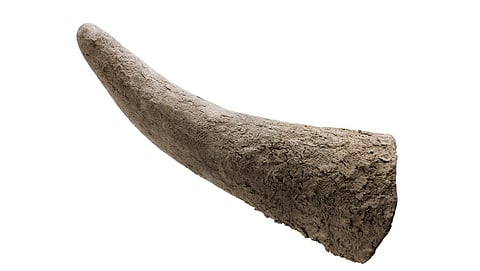

Two persons involved in rhino horn trafficking have been convicted in Mozambique, in what is being seen as a significant blow to illegal wildlife trade in southern Africa.
Simon Valoi a.k.a Navara has been sentenced to 27 years of prison while Paulo Zucula has been punished for 24 years, according to a statement from the Wildlife Justice Commission (WJC).
The WJC are a group of law enforcement and legal experts, who aim to disrupt and help dismantle organised crime networks trafficking wildlife, timber and fish.
The conviction follows the arrest of the duo on July 27, 2022, by the Serviço Nacional de Investigação Criminal (SERNIC), Portuguese for ‘National Criminal Investigation Service’. SERNIC — which operates under the command of the country’s minister of interior — was assisted by the WJC, as per its statement.
Both, Valoi and Zucula, were found to be in possession of four rhino horns weighing 2.9 kilograms at the time of the arrests. These were confiscated by officials.
Valoi is a notorious rhino horn poaching kingpin. He has mainly targeted the species in South Africa’s Kruger National Park.
Kruger, with the Parque Nacional do Limpopo in Mozambique and Gonarhezou National Park in Zimbabwe, forms part of the Great Limpopo Tranfrontier Park. The latter is a cross-border conservation initiative between the three countries.
Terming the conviction as a ‘significant victory’, the WJC said the action is expected to severely disrupt wildlife trafficking networks across southern Africa.
According to a statement issued by WJC, “On 16 August 2024, Valoi was convicted on multiple charges: 16 years for illegal wildlife trade, eight years for criminal association, and 16 years for money laundering. He received a 27-year sentence, along with fines equivalent to 16 years, totalling approximately 170,000 USD in compensation to the state, and the confiscation of assets worth approximately 140,625 USD.”
Zucula was sentenced to 24 years, with fines for 16 years, totalling approximately 62,500 USD in compensation to the state, and assets worth approximately 265,625 USD seized, the statement read.
Rhino horn trafficking is a crucial threat to the species and must be treated as ‘transnational organised crime’, according to a report titled Rhino horn trafficking as a form of transnational organised crime (2012–2021): 2022 Global Threat Assessment.
The report, cited by the WJC statement, pointed out that over 50 countries were implicated in the illegal wildlife trafficking of rhino horn. But six countries dominated its supply chain, source, transit and destinations.
Corruption is a major enabler of rhino horn trafficking. The report noted that one third of rhino horns were smuggled unconcealed, indicating potential reliance on corruption to move shipments through supply chains.
The report also found that there was significant increase in weight of rhino horns seized, despite a reduction in poaching.
“There are various types of crime convergence associated with rhino horn trafficking and seizure data indicate there could be crime convergence with firearms, illicit drugs, and other commodities in approximately 10% of cases,” the report said.
The conviction marks an important achievement in the global fight against wildlife crime that threatens the survival of rhinos in Mozambique and southern Africa at large, Olivia Swaak-Goldman, executive director of WJC, was quoted as saying.
“Although all major African rhino range states have been affected by rhino poaching to varying degrees; South Africa and its largest wildlife reserve, Kruger National Park, have borne the brunt of the poaching crisis,” she said.
Poaching data from 2022 shows a shift, with poachers shifting operations from Kruger to other parks and provinces in South Africa, as well as other countries in southern Africa.
Deterrents like the disruptive impact of targeted law enforcement efforts and strong penalties awarded to high-level criminals such as Valoi are contributing to this shift, the statement noted.